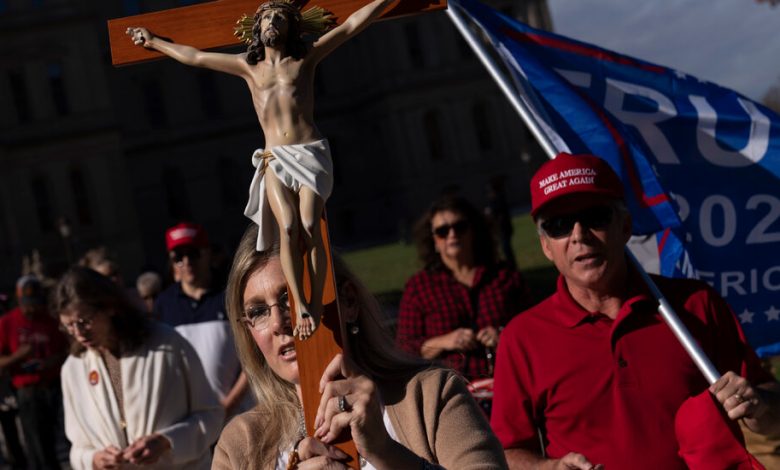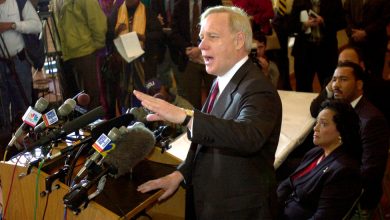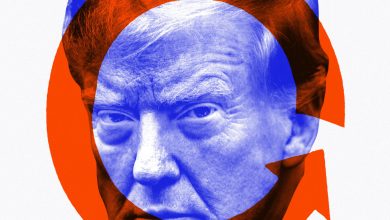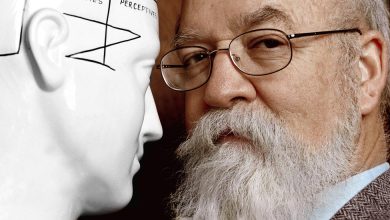The Deification of Donald Trump Poses Some Interesting Questions

On Oct. 15, 2020, in a rare display of humility, Donald Trump told a campaign rally in Greenville, N.C., that he was not as famous as Jesus Christ.
“Somebody said to me the other day ‘You’re the most famous person in the world by far.’ I said, ‘No, I’m not.’ They said, ‘Yes, you are. I said no.’ They said, ‘Who’s more famous?’ I said, ‘Jesus Christ.’ ”
This exhibition of modesty was out of character.
Trump, his family and his supporters have been more than willing to claim that Trump is ordained by God for a special mission, to restore America as a Christian nation.
In recent weeks, for example, the former president posted a video called “God Made Trump” on Truth Social that was produced by a conservative media group technically independent of the Trump campaign. He has also screened it at campaign rallies.
The video begins as a narrator with a voice reminiscent of Paul Harvey’s declares: “On June 14, 1946, God looked down on his planned paradise and said: ‘I need a caretaker.’ So God gave us Trump.”
Why was Trump chosen? The video continues:
The video claims to quote God directly:
The “God Made Trump” video was created by the Dilley Meme Team, described by Ken Bensinger of The Times as
The video, along with Eric Trump’s claim that his father “literally saved Christianity” and the image Trump himself reposted on Truth Social of Jesus sitting next to him in court, raise a question: Does Trump believe that he is God’s messenger or are his direct and indirect claims to have a special relationship with God a cynical ploy to win evangelical votes?
I posed this and other questions to Barry Hankins, a professor of history at Baylor and editor of the Journal of Church and State. Hankins replied by email: “Over the years since there has been a growing chorus of voices saying Trump is the defender of Christians and Christianity. Trump says this himself all the time, ‘When they come after me, they’re really coming after you.’ ”
There are photos, Hankins continued, “of evangelicals laying hands on him in the Oval Office, which is something that Christians do when they ordain pastors or commission missionaries, or Jan. 6 insurrectionists carrying large crosses and praying as they attack the Capitol. People at his rallies carrying signs that say, ‘Thank you Lord Jesus for President Trump.’ And on and on.”
I asked Hankins whether Trump’s evangelical supporters “see him as a Jesus-like figure?”
Hankins replied, “I think ‘Jesus-like’ is well put. When the indictments came down during Lent last spring, there were references to the powers of government going after Trump like the Roman Empire went after Jesus.”
Trump’s evolution into a Jesus-like figure for some, but not all, white evangelicals began soon after he launched his first presidential campaign. As David P. Gushee, a professor of Christian ethics at Mercer University explained by email:
In this sense, Gushee continued, “a savior does not have to be a good person, but just needs to fulfill his divinely appointed role. Trump is seen by many as actually having done so while president.”
This view of Trump is especially strong “in the Pentecostal wing of the conservative Christian world,” Gushee wrote, where
The multiple criminal charges against Trump serve to strengthen the belief of many evangelicals about his ties to God, according to Gushee:
Representative Marjorie Taylor Greene, a Georgia Republican, gave voice to this phenomenon when she protested the filing of criminal charges against Trump. On her way to a pro-Trump rally in Manhattan on April 3, 2023, Greene told Brian Glenn of the Right Side Broadcasting Network:
The more interesting case, Gushee wrote,
Certain denominations among evangelicals are more willing to believe Trump is God’s messenger than others. John Fea, a professor at Messiah University in Georgia wrote by email that
“This whole movement,” Fea wrote,
But even this group of Christians does not see Trump as the messiah, Fea wrote: “They will be quick to tell you that only Jesus is the messiah. They do not believe Trump has special powers, but he is certainly an agent or vessel for God to work through to make America Christian again.”
As far as Trump goes, Fea continued, “he probably thinks these Charismatics and Pentecostals are crazy. But if they are going to tell him he is “God’s anointed one,” he will gladly accept the title and use it if it wins him votes. He will happily accept their prayers because it is politically expedient.”
Robert P. Jones, founder and chief executive of P.R.R.I. (formerly the Public Religion Research Institute), contends that Trump’s religious claims are an outright fraud:
Trump, Jones added in an email, “almost certainly lacks the kind of religious sensibility or theological framework necessary to personally grasp what it would even mean to be a Jesus-like, messianic figure.”
Despite that, Jones wrote, “many of his most loyal Christian followers, white evangelical Protestants, have indeed come to see him as a kind of metaphorical savior figure.”
According to Jones, in order to rationalize this quasi-deification of Trump — despite “his crassness and vulgarity, divorces, mocking of disabled people, his overt racism, and a determination by a court that he sexually abused advice columnist E. Jean Carroll” — white evangelicals refer not to Jesus but the Persian King Cyrus from the book of Isaiah in the Hebrew Bible.”
In that story, Jones recounted in his email,
According to Jones, “White evangelicals’ stalwart, enduring support for Trump tells us much more about who they see themselves to be than who they think Trump is. As I argued in my most recent book, ‘The Hidden Roots of White Supremacy,’ ” Jones continued in his email, “the primary force animating white evangelical Protestant politics — one that has been with us since before the founding of the republic — is the vision of America as a nation primarily of, by, and for white Christians.”
Jones cited a 2023 P.R.R.I. survey that showed “a majority (56 percent) of white evangelical Protestants, compared to only one third of all Americans, believed that ‘God intended America to be a new promised land where European Christians could create a society that could be an example to the rest of the world.’ ”
Jones argued that Trump’s declaration on the ellipse on Jan. 6, 2021 — “We fight like hell. And if you don’t fight like hell, you’re not going to have a country anymore” — was a direct appeal “to this sense of divine entitlement of those who believed this mythology strongly enough to engage in a violent insurrection.”
While Trump has overwhelming backing from white evangelical Christians, many of whom invest him with exceptional ties to God, there are also strong secular factors underpinning this support from evangelicals.
Jim Guth, a political scientist at Furman University and an expert on the role of religion in politics, published an article in 2019, “Are White evangelicals Populists? The View From the 2016 American National Election Study.” The essay describes the basis for the strong affinity of white evangelicals for Trump’s conservative populism.
“White evangelicals,” Guth found, “are invariably the most populist: more likely to favor strong leadership (even when that means breaking the rules), to distrust government, to see the country on the ‘wrong’ track, and to think that the majority should always rule (and minorities adapt).”
Guth also found that
Guth ranked religious groups on their level of support for conservative populism and found that
Guth wrote that his “findings help us understand what many have struggled to comprehend: how can white evangelical Protestants continue to provide strong support for President Donald Trump, whose personal values and behavior trample on the biblical and ethical standards professed by that community.”
The most common explanation, according to Guth,
“The evidence here,” he wrote, “suggests a more problematic answer”:
Guth took his analysis a step farther, suggesting that pro-Trump, conservative populism has become entrenched in the white evangelical community:
Guth went on:
In other words, conservative populism, with all its anti-democratic implications, has taken root in America. What we don’t know is for how long — or how much damage it will do.
The Times is committed to publishing a diversity of letters to the editor. We’d like to hear what you think about this or any of our articles. Here are some tips. And here’s our email: [email protected].
Follow the New York Times Opinion section on Facebook, Instagram, TikTok, X and Threads.





